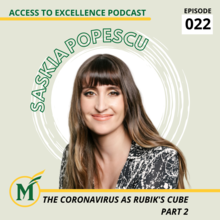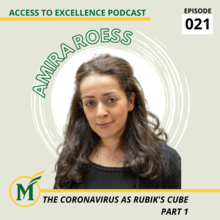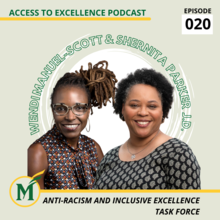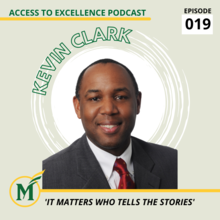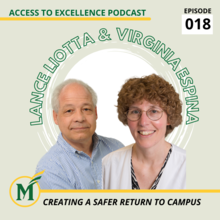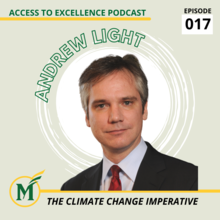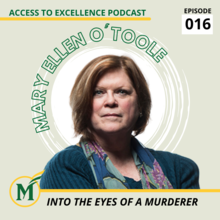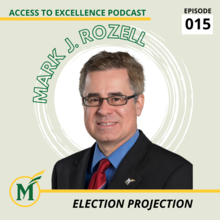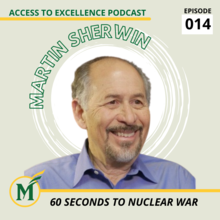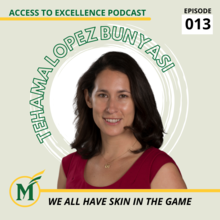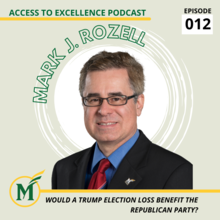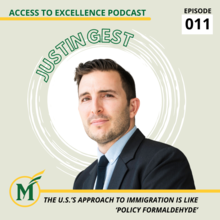A podcast All Together Different
Join George Mason University President Gregory Washington as he invites experts, change-makers, innovators, and thought leaders to engage in meaningful conversations about the greatest challenges of our time.
Listen and learn from audacious people from Mason and beyond who represent the diversity of insight, the agility of collaboration, and the tenacity required in the struggle for a better future that is at the essence of the Mason Nation.
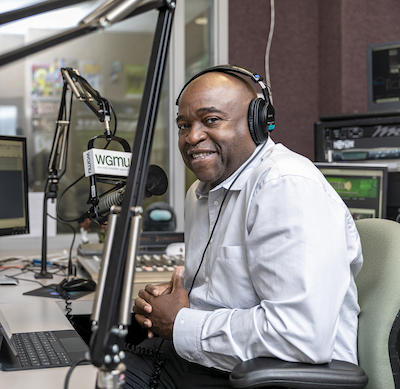
President Gregory Washington hosts each episode of the Access to Excellence podcast, recorded on the campus of George Mason University.
What will become of the Amazon? (Episode 58)
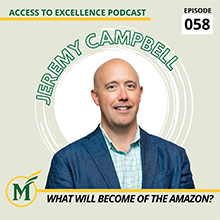
Jeremy Campbell, associate director for strategic engagement in George Mason University’s Institute for a Sustainable Earth, says that at its current pace the vast Amazon rainforest, in five to 10 years, could pass a tipping point in which it could transform into grasslands. That process, fueled by deforestation and climate change, is a threat to the biodiversity and socio-cultural aspects that define the region, and has global implications as well. In this fascinating conversation in recognition of Earth Month, Campbell explains to Mason President Gregory Washington the magnitude of what the loss of the Amazon rainforest would really mean and how the Institute for a Sustainable Earth is on the front lines in the region. Listen now.
"Where there used to be forest, you're not going to get any more of that transpiration cycle, and so the dryness isn't limited to the places where deforestation happens. Where things are really dry, things get hotter. And when you add what we had last year, with the horrible situation throughout the Amazon of an El Nino induced heat spike and drought, then you have villages that rely on the rivers to get around that are literally stranded. So the drying out of the Amazon is a tremendous biodiversity challenge, it's also a tremendous economic challenge. But it's also a human tragedy that is taking tremendous costs on the people of the Amazon as well."
Jeremy Campbell
Access to Excellence, Episode 58
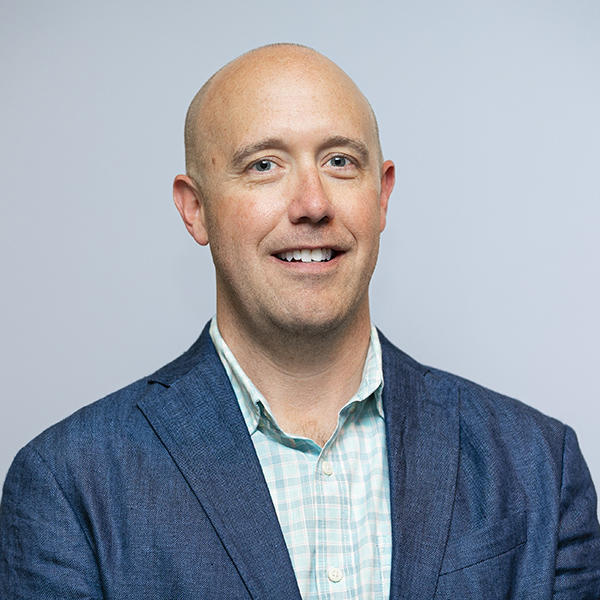
Jeremy Campbell is associate director for strategic engagement at George Mason University's Institute for a Sustainable Earth.
Subscribe on Your Preferred Platform
All Episodes
- March 29, 2021Host and Mason President Dr. Gregory Washington speaks with Mason epidemiologist and public health expert Saskia Popescu about what she has experienced on the front lines of the COVID-19 pandemic.
- March 12, 2021How could the U.S. have improved its response to the COVID-19 pandemic? Mason president Gregory Washington hosts CHHS epidemiologist, Amira Roess, PhD MPH, as she breaks down the many factors impacting the nation's response and recovery.
- February 22, 2021How are anti-racism efforts building on college campuses? How will Mason affirm its core values and mission of inclusion? President Gregory Washington speaks with Wendi Manuel-Scott and Shernita Parker, co-directors of Mason's Anti-Racism and Inclusive Excellence Task Force about the university's commitment to be a national leader in this dialogue.
- February 19, 2021In this fascinating conversation, President Gregory Washington speaks with Kevin Clark, director of original animation for preschool programming at Netflix, and retiring professor in the Learning Technologies Division in George Mason University’s College of Education and Human Development, about how technology and economics are helping fuel the rich entertainment content highlighting people of color, and how that programming can be a conduit for anti-racism efforts.
- January 29, 2021On Jan. 22, Mason President Gregory Washington spoke with Mason scientists Lance Liotta and Virginia Espina, who head the university’s effort to push the boundaries of technologies that are keeping its three university campuses safe from COVID-19. That includes a rapid-result saliva test, and development of an antibody test that can track a body’s response to the virus and vaccine.
- January 29, 2021Fighting climate change is a global imperative, and the consequences of inaction could be dire. But Mason's Andrew Light, who helped negotiate the Paris Agreement on climate, tells Mason President Gregory Washington that for the go-getters, opportunity awaits.
- January 29, 2021What's it like to interview a mass murderer? Professor Mary Ellen O'Toole, a former FBI profiler, fills us in on that and Mason's new Forensic Science Research and Training Laboratory, which will be one of only eight in the U.S. to use donor remains for forensic research.
- January 29, 2021How did the election play into our national identity? How did Donald Trump mold the Republican Party in his image? How can we reform the Electoral College? Mason President Gregory Washington speaks with Schar School Dean Mark J. Rozell on where our politics goes from here.
- January 29, 2021Professor and Pulitzer Prize-winning author Martin J. Sherwin discusses his new book about the Cuban Missile Crisis and tells a terrifying, and not well-known, story of how close we came to nuclear war with the Soviet Union.
- January 29, 2021Tehama Lopez Bunyasi, assistant professor in the Carter School for Peace and Conflict Resolution, explains how using our democratic freedoms will help overcome racism in America.
- January 29, 2021Schar School Dean Mark J. Rozell provides an unbiased analysis of the stakes heading into the presidential debates -- with some debate history thrown in as well.
- October 16, 2020Mason's Justin Gest, an expert on immigration and the politics of demographic change, explains why the U.S., from the outside looking in, appears to be a "closed angry giant."




